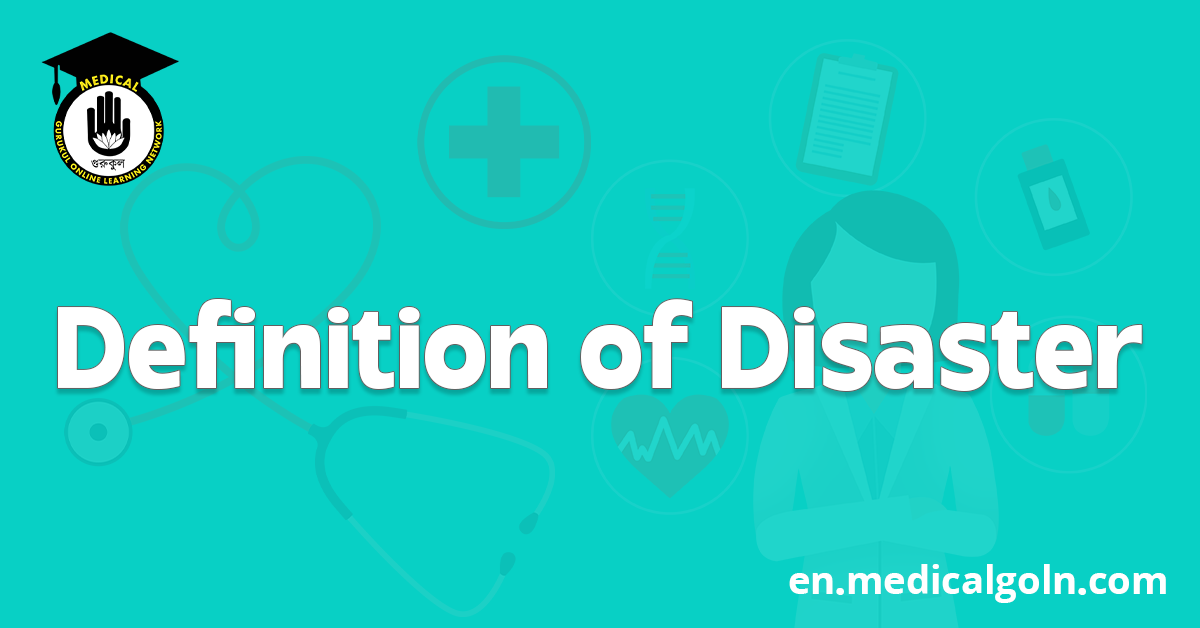Today is our topic of discussion Definition of Disaster
Definition of Disaster

Definition:
An event, natural or man-made, sudden or progressive resulting in a serious disruption of functioning of society and widespread human, material or environmental losses exceeding the ability of the affected community to cope using its own resources.
Morbidity and mortality rates in a disaster are highly variable and depend upon –
1. Type of disaster
2. Time of occurrence
3. Duration of impact
4. Levels of preparedness and safety measures
5. Time between warning and impact
6. Community awareness about disaster risk and vulnerability, mitigation and response capacity to it
Emergency:
An emergency is a situation which poses an immediate risk to health, life, property or environment. Most emergencies require urgent intervention to prevent a worsening of the situation.
Level of disaster:
- Level 1: The local disaster response management system is able to respond
- Level 2: Support is required from regional sources
- Level 3: Local and regional resources are overwhelmed and additional assistance is required oog te villa
- Level 4: Additional International assistance is required
Type of Disaster:
Natural Disaster
Geological :
Earthquake, Land Slides, River Erosion, Volcanic eruption etc.
Climatological:
Cyclone, Flood, Tornado, Drought etc.
Environmental:
Green House Effect, Deforestation, Desertification, Pest Attack etc.

Epidemic :
Water born, Vector born diseases
Man-made Disaster:
Road Accident, Water Logging, Fire, Artificial Famine, Political unrest, War, Civil War/Conflict, etc.
Phases of disaster:
Natural phases:
1.Pre-disaster phase
2.Impact phase
3.Post-disaster phase (rescue, relief, rehabilitation)
Behavioural and Psychological phases:
1. Impact phase (fear)
2. Heroism phase (rescue)
3.Honeymoon phase (shared good outcome)
4. Disillusionment phase (discontentment) and
5. Reorganization phase
Victim response phases:
1. Impact phase (fear, psychosis, loss)
2. Interaction phase (feeling of conflict)
3. Acceptance phase (to survive)
Acquiescence phase (humiliation, rage)
Effects of natural disaster:
1. Loss of life
2. Severe injuries
Health hazards –
a. Infection
b. Malnutrition
c. Outbreak of food & water-borne and other communicable diseases such as, diarrhoea, measles, scabies, tuberculosis etc.
d. Outbreak of vector-borne disease dengue, malaria etc.
e. Mental ill-health
4. Damage and destruction of property and crops
5. Social and psychological after-effects
6. Disruption to essential services
7. Disruption to life-style
8. National economic loss
9. Major population movement

[Q. Health effects in a natural disaster area?
Q. Common health problems in flood/cyclone/tornado affected area?
Ans. Health hazards above]
See also :

1 thought on “Definition of Disaster”